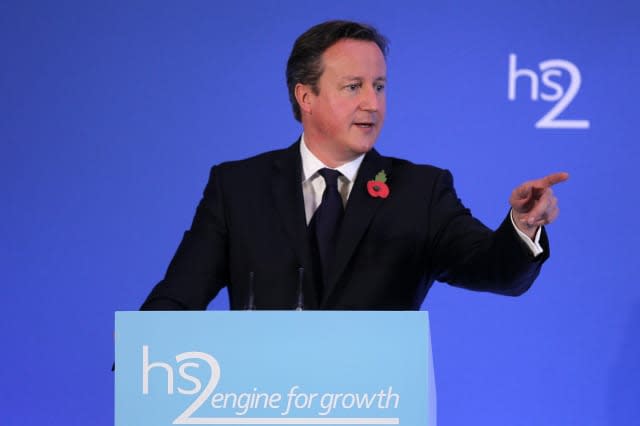PM signals £15bn 'roads revolution'

David Cameron has promised the biggest programme of road-building since the 1970s to deal with around 100 of the worst "pinch points" on England's roads.
The Prime Minister told business leaders that he would spend £15 billion by the end of the decade on a road-building programme, understood to include hundreds of extra lane miles on motorways and trunk roads as part of a "roads revolution" to speed up journey times.
Plans to build a tunnel under Stonehenge have reportedly been looked at by the Government to help ease congestion on the A303 and the route to the south west is among those that is set to benefit from the cash.
Work on stretches of the A1 north of Newcastle, roads across the Pennines, the A47 in the east of England and the A27 on the south coast are also in line for funding in a package to be set out by Chancellor George Osborne in next month's Autumn Statement.
Speaking to the Confederation of British Industry (CBI) conference in London, Mr Cameron said that the coalition Government inherited a "weak" position on infrastructure, after the previous Labour administration delivered "the lowest infrastructure investment of any OECD country" between 2000
and 2007.
But he said he was determined to ensure that "as a country we have the infrastructure that can deliver a successful modern economy for the entire nation" and was able to offer "a big investment only possible because we have managed our nation's finances effectively".
Mr Cameron said: "We are now not only spending as much on rail as any Government since Victorian times, but on roads we are spending more than any Government since the big expansion of the 1970s.
"Between now and 2020, we have plans for £15 billion of road spending. That could lead to an extra 100 schemes being undertaken on our roads, and we are looking specifically at those pinch points, those problem areas, that businesses and people have told us about, and told us are so essential."
Mr Cameron said he had resisted pressure to cut spending on infrastructure as part of the austerity drive to reduce Britain's national deficit. As well as spending on transport links, he said he was "very, very proud" that Britain's nuclear sector was being revived as part of an "absolutely vital" investment in energy production and believed that it was essential to improve broadband communication
networks.
"We've had to take difficult decisions in terms of spending, in terms of efficiencies, but we have prioritised infrastructure spending," he said.
"It would have been very easy as Prime Minister, faced with the decisions I had to take, to cancel Crossrail, to give up on HS2, not to talk about electrification of railways, not to talk about road or energy investment. I rejected that approach.
"I know that for Britain to succeed we've got to make those infrastructure investments.
What I can say today is we will continue to complete Crossrail, we will continue the work on HS2. I think the vision of HS3, creating a Northern powerhouse across our country, is extremely powerful."
AA president Edmund King welcomed the announcement, saying: "Roads carry 90% of goods and people and are our biggest transport asset and so it makes perfect sense to upgrade them to help
the UK economy by improving journey times for people and business."
RAC Foundation director Professor Stephen Glaister said: "The Chancellor collects more than £30 billion in road fuel duty and Vehicle Excise Duty (car tax) alone but spends just a quarter of this on the road network. If a larger share of this income will now be used to upgrade our highways, which
are a vital national asset, then that is welcome.
"This announcement has to be seen against the rapidly-rising population which will cause only more congestion on the roads unless there is significant investment in removing the pinch points."
But shadow transport secretary Michael Dugher dismissed it as "another pre-election con trick from David Cameron".
"Far from taking big decisions on transport, Cameron has dithered for five years on airport expansion and has been so slow to bring forward the HS2 Bill that it won't pass in this Parliament," said Mr Dugher.
"This desperate so-called announcement of promised road improvements includes no additional money and people simply won't fall for it. When it comes to road investment, the truth is Cameron leaves us like a frustrated motorist trying to get through the rush hour - we're stuck going nowhere
fast."
Chris Todd, roads campaigner at the Campaign for Better Transport, said: "The road building schemes the Government is so keen to talk up will trash protected areas and do nothing for the economy.
"It makes no sense to spend billions ploughing more lanes of traffic through our National Parks or desecrating irreplaceable historic sites like Stonehenge.
"These schemes will make people more dependent than ever on their cars, place greater costs on the NHS, while failing to tackle problems like the massive backlog of pot holes blighting local roads."

Read more on AOL Money
Entrepreneur builds toll road to bypass road closed by landslip
The most lucrative speed camera in the UK



